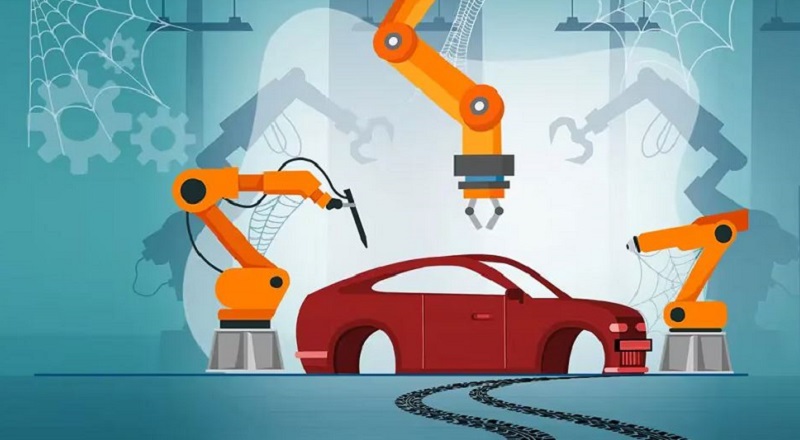
Productive stoppage, suspensions with salary reduction. Commercial debts with suppliers, which have not been resolved, are a problem in automotive production, characterized by the intensive use of imported parts and inputs. They come from a year of record production, while the cost of the suspensions added to the collapse of salaries falls on the workers in the sector. Meanwhile the union, which has great firepower, lets this adjustment pass.
In the first three months of the government of Mileo inflation accumulates more than 70%, remains very high. The 118% devaluation shock in December accelerated the liquidation of salaries (13.6%), causing a sharp drop in consumption. The effects of chainsaw and blender plan deepening the recession, with growing economic and political uncertainty. The economy ended 2023 with a decline of 1.6%, and the manufacturing industry It plummeted 11.9% in December compared to the same month of the previous year.
In this context, the powerful automotive industry has not yet defined its production projections for 2024. At the same time, the lack of dollars to pay off the million-dollar commercial debts of companies with their suppliers slows down production due to a lack of parts and supplies. The response of the automotive employers was to extend the summer recess period and with it, the suspensions of workers with reduced wages.
You may be interested in: AmCham. Business meeting: employers demanded consensus and anti-worker reforms from the Government
You may be interested in: AmCham. Business meeting: employers demanded consensus and anti-worker reforms from the Government
It’s about a sector that represents 8% of industrial GDP, has 12 terminal companies (Volkswagen, Toyota, General Motors, Fiat, Ford, PSA Peugeot, Mercedes Benz, Honda, Renault, Nissan, Iveco and Scania) and around 200 auto parts companies. The automotive industry as a whole concentrates in the country about 150 thousand workers. All terminals are foreign and are located mainly in the northern area of the GBA, Córdoba and Santa Fé. Among the auto parts companies that supply the terminals, there are multinationals (global sourcing method) and other smaller scale national ones. Around these industries there are different links that provide necessary materials and services, which complete the automotive auto parts chain.

The automotive industry in numbers
The sectoral data collected by the Association of Automotive Factories (ADEFA) for the months of January and February of this year showed the following mixed results:
The Total vehicle production was 60,134 unitsIt is a 18.2% drop compared to the same period in 2023. In absolute terms, in the first two months of the year, 13,336 fewer units were produced than in 2024.

Las wholesale sales to dealerships in the accumulated of the January-February two-month period feu of 49,176 units, a drop of 5.9% compared to the last 12 months. This decline in the domestic market is related to the sharp drop in consumption, as a consequence of the high inflation that pulverizes the purchasing power of broad layers of society.
The December devaluation deepened the rise in the price of cars that are priced in the official dollar. Some specialists point out that for this reason, when the price lists were adjusted, practically all cars were reached by the automobile tax. This implied an increase of 150% in the case of the best-selling models (Fiat Cronos and Peugeot 208). As of the end of January, an update of the scales began to take effect, which partly explains an attenuation of this effect. In January, wholesale sales to dealerships collapsed by 27.9% (yoy), while in February there was a rebound of 10.9% (yoy).

Las Sales abroad were those that showed an opposite trend with an increase of 10.1% in the first two years of 2024 (ia). The report indicates that the volume of vehicles exported in that period was 38,886 units. The main destination of exports continues to be Brazil (73%).
Exports in January and February represent 64.7% of the accumulated production in those months. With these results, exports could become an outlet to be reinforced by the terminals. Both because of the drop in sales in the country due to the crisis, and because of the advantages of betting on larger markets like Brazil. The president of Toyota, Gustavo Salinas, stated that the Zarate (Campana) plant will begin exporting the Toyota Hiace to Brazil. “This is an initial investment of US$50 million and 100 jobs will be created,” he said.

Import debt
The debt for imports cuts across the entire industry, characterized by having a backward and dependent productive structure that needs these inputs to launch national production. In particular, the automotive industry has an intensive demand for imported parts. For each unit manufactured, the ratio between imported and domestic components is 70%-30%.
The commercial debt of the automotive sector (terminals and auto parts) with its suppliers amounts to US$7 billion. In an economy without dollars, the new government launched the Bonds for the Reconstruction of a Free Argentina (BOPREAL) for importers of goods and services, which will be settled until 2027 and in dollars. With the help of Caputo, the aim is to nationalize the private debt of companies.
You may be interested: Caputo did it again: nationalization of external private debt
You may be interested: Caputo did it again: nationalization of external private debt
In the first tenders for the bond (end of December), Toyota was the only terminal that accessed Bopreal. “Given this situation and based on a very in-depth analysis with the parent company, we made the decision to subscribe to Bopreal as a way to solve our debt problem,” said Salinas. And he added that regularizing commercial debt is key “to continue with investments in the future, which is one of the objectives in the short and medium term.” The rest of the automakers and auto parts manufacturers continued to evaluate the proposal; it was only at the end of January 2024 when Volkswagen and Stellantis decided to enter.
Without access to dollars, companies that did not subscribe to Bopreal stopped paying debts to suppliers, who would have cut off supply shipments. Since the government began to release foreign currency in installments for the payment of new imports, this measure should alleviate the situation of shortage of parts.
Faced with a problem that may be objective, we must not lose sight of the fact that in many cases the terminals incur commercial debts with their own parent companies (they go into debt within the same group). These external private debts have often been maneuvers to guarantee the outflow of capital.
You may be interested in: X-ray of private external debt, an escape route for foreign currency
You may be interested in: X-ray of private external debt, an escape route for foreign currency
Stop boss blackmail
The production stoppage with suspensions lasted until March in some terminals such as General Motors, Volkswagen, Renault and Nissan.
For the terminals, the main reason for putting a stop to production during the summer was the lack of imported inputs. However, the economic crisis that is deepening with high inflation, recession and expectations of devaluation, conditions the lack of clear projections in an industry that closed 2023 with a production of 610,715 units. A record in nine years, just below the 617,329 in 2014.
According to journalistic information, some terminals hope to reduce the production level by 2024. In Iveco They would be willing to reduce production by up to 40%, this would imply maintaining the suspensions. The mega group Stalling (merger between PSA and Fiat Chrysler), decided to adjust the production of Cronos (Córdoba) downwards (13%), in response to the sharp drop in patents of more than 30% in January and February. They also intend to reduce the number of Peugeot 208 cars, manufactured in Palomar (PBA). There are cases with some level of investment – made in 2023 – for the launch of new lines. As Toyota with the Hiace, or Volkswagen (Pacheco) with the new Amarok model. For its part, Ford announced an 18% increase in its production, mainly betting on the Ranger (Pacheco PBA) for export.
As in the rest of the national economy, at the moment the outlook for the sector has a share of uncertainty. But the possibility of continuing to export or deepening that profile could serve as a buffer against the fall in domestic sales. In any case, these are multinationals that are coming from years of recovery and increased production, receive tax extensions and pay increasingly devalued salaries.
You may be interested in: The economic minefield and the war plans against the people
You may be interested in: The economic minefield and the war plans against the people
What is the level of crisis in this industry that resolves to maintain suspensions with salaries that are paid with reductions? To rehearse a response, at least two axes are opened to be taken into account.
The first, related to salaries as adjustment variables. In the face of each crisis, the employers try to socialize the losses with the workers, something that does not happen in times of prosperity. National vehicle production was a record in 2023, multinationals are starting from a situation that would allow them to go through this stoppage without deducting the salaries of operators. On the other hand, if access to the balance sheets of these companies were public, it would be possible to truly know their costs and avoid all types of fraudulent maneuvers.
The second has to do with a structural aspect that deserves to be rethought. The lack of imported parts due to the lack of dollars generates bottlenecks and prolonged stoppages in the sector. This industry functions as a parts assembler. This explains why the difference between the dollars that go out to finance imports and those that enter through exports is negative.
Given that the country suffers recurrent crises of external restriction, which are explained by different reasons such as capital flight, maneuvers related to under-declaration of exports or import festivals, remittances from multinationals to their parent companies. It is the payments of the external debt that have great centrality, while the agreement with the IMF remains in force The bleeding of dollars will continue and the internal contradictions of the backward and dependent structure of the national economy will be accentuated. The automotive industry’s demand for dollars and its growing private commercial debt are part of this problem, sustained by previous Peronist governments and now Mile’s. Thinking about how the automotive industry could function if social needs are put first and not the profits of multinationals, becomes necessary.
You may be interested in: The promoted automotive industry and its recent transformations. Profits without brakes
You may be interested in: The promoted automotive industry and its recent transformations. Profits without brakes
Illustration: Oscar Roldán
National Economy / Ecology and environment / Suspensions / Automotive
Source: www.laizquierdadiario.com

